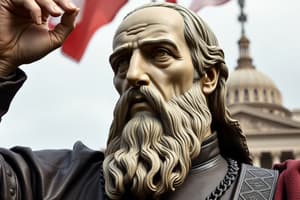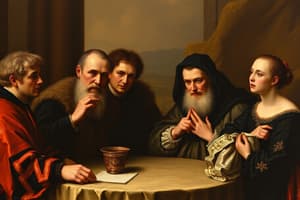Podcast
Questions and Answers
What was a core belief of the Enlightenment that influenced the view of progress?
What was a core belief of the Enlightenment that influenced the view of progress?
- Inherent social hierarchy
- Power of human reason and critical thinking (correct)
- Tradition as a guiding principle
- Reliance on religious authority
Which of the following was a significant change in society brought about by the rise of printing in the 1700s?
Which of the following was a significant change in society brought about by the rise of printing in the 1700s?
- Reduction in the number of publishers
- Increased accessibility of literature (correct)
- Decline in literacy rates
- Limitations on the types of content published
Which event marked the beginning of British colonial rule in India?
Which event marked the beginning of British colonial rule in India?
- The Battle of Plassey (correct)
- The Sepoy Rebellion
- The First Anglo-Maratha War
- The Treaty of Paris
What ideological influence contributed to the causes of the French Revolution?
What ideological influence contributed to the causes of the French Revolution?
Which of the following was a result of Protestant influence on education?
Which of the following was a result of Protestant influence on education?
What was one principle Napoleon spread throughout Europe after the French Revolution?
What was one principle Napoleon spread throughout Europe after the French Revolution?
How did Enlightenment thinkers view the structure of society and government?
How did Enlightenment thinkers view the structure of society and government?
What key factor contributed to the severe economic issues leading to the French Revolution?
What key factor contributed to the severe economic issues leading to the French Revolution?
What was Machiavelli’s view of good government?
What was Machiavelli’s view of good government?
What were the primary motivations for the Age of Exploration?
What were the primary motivations for the Age of Exploration?
What was one major criticism that Martin Luther had against the Catholic Church?
What was one major criticism that Martin Luther had against the Catholic Church?
What was the impact of the 30 Years’ War on the Holy Roman Empire?
What was the impact of the 30 Years’ War on the Holy Roman Empire?
How did Louis XIV exemplify the traits of an absolute monarch?
How did Louis XIV exemplify the traits of an absolute monarch?
What were the key results of the English Civil War?
What were the key results of the English Civil War?
What was a significant outcome of the Glorious Revolution?
What was a significant outcome of the Glorious Revolution?
What connection existed between the Scientific Revolution and the Enlightenment?
What connection existed between the Scientific Revolution and the Enlightenment?
Flashcards
Machiavelli's View on Good Government
Machiavelli's View on Good Government
Machiavelli believed good governance requires acknowledging human fallibility, focusing on achieving practical results even if it means deviating from moral principles.
Motivations for the Age of Exploration
Motivations for the Age of Exploration
The Age of Exploration was fueled by a combination of religious zeal, desire for fame, and the pursuit of wealth, primarily through trade and colonization.
Reformer's Objection to Indulgences
Reformer's Objection to Indulgences
Martin Luther and other reformers objected to the Church's practice of selling indulgences, claiming it was unbiblical and exploited people's fear of hell.
Luther and Calvin's Religious Views
Luther and Calvin's Religious Views
Signup and view all the flashcards
Impact of the Thirty Years' War
Impact of the Thirty Years' War
Signup and view all the flashcards
Louis XIV's Approach to Warfare
Louis XIV's Approach to Warfare
Signup and view all the flashcards
Results of the English Civil War
Results of the English Civil War
Signup and view all the flashcards
Outcomes of the Glorious Revolution
Outcomes of the Glorious Revolution
Signup and view all the flashcards
How did the Scientific Revolution pave the way for the Enlightenment?
How did the Scientific Revolution pave the way for the Enlightenment?
Signup and view all the flashcards
What is the Enlightenment's view of progress?
What is the Enlightenment's view of progress?
Signup and view all the flashcards
How did Protestantism influence education?
How did Protestantism influence education?
Signup and view all the flashcards
Explain the British East India Company's activities in India during the 1700s.
Explain the British East India Company's activities in India during the 1700s.
Signup and view all the flashcards
Describe the changes in reading habits during the 1700s.
Describe the changes in reading habits during the 1700s.
Signup and view all the flashcards
What were the causes of the French Revolution?
What were the causes of the French Revolution?
Signup and view all the flashcards
What parts of the French Revolution did Napoleon spread?
What parts of the French Revolution did Napoleon spread?
Signup and view all the flashcards
How did the Enlightenment influence the French Revolution?
How did the Enlightenment influence the French Revolution?
Signup and view all the flashcards
Study Notes
Machiavelli's View of Government
- Machiavelli believed government was founded on the weaknesses and limitations of human nature.
Age of Exploration Motivations
- Primary motivations were "God, glory, and gold."
Catholic Church Abuses (Lutheran & Reformist Protest)
- Reformers protested the Church's greed and the practice of indulgences.
Luther & Calvin's Stance
- Indulgences: Rejected as unbiblical.
- Salvation: Emphasized salvation by faith alone (sola fide); Calvin added predestination.
- Authority: Believed the Bible was the ultimate source of authority (sola scriptura), rejecting papal power.
30 Years' War Impact
- Weakened the Holy Roman Empire, granting individual states near-total sovereignty.
Louis XIV and Warfare
- Embodied absolute monarchy through aggressive warfare, aiming to expand French territory and consolidate power, motivated by personal glory.
English Civil War Results
- King Charles I executed.
- Commonwealth established (under Oliver Cromwell).
- Monarchy restored, but with Parliament's increased authority.
Glorious Revolution Results
- Established a constitutional monarchy, significantly limiting the King's power and enhancing Parliament's authority.
Scientific Revolution & Enlightenment Connection
- The Scientific Revolution fostered reason, observation, and critical thinking, which became the foundation of Enlightenment ideals.
Enlightenment and Progress
- Enlightenment fostered optimism about human progress through reason and knowledge application, leading to a belief in linear historical advancement.
- This viewed societal structures as rationally redesigning needed.
Protestant Influence on Education
- Protestantism, initiated by Martin Luther, greatly encouraged education expansion.
English Activity in 18th Century India
- British East India Company expanded influence in India, transitioning from trade to political control, beginning with the Battle of Plassey (1757).
18th Century Reading Changes
- Increased accessibility of reading materials (books, pamphlets, newspapers) expanded literacy, fostering the spread of Enlightenment ideas.
- Reading served educational and recreational purposes, including practical guidance (almanacs), entertainment (jokes, fairy tales).
French Revolution Causes
- Poor absolute monarchy leadership.
- Severe economic issues (debt, food shortages).
- Ideological influences from the Enlightenment.
Napoleon's Spread of Revolutionary Ideas
- Legal equality.
- Abolition of feudalism.
- Religious tolerance.
- Meritocratic government/military system.
- Nationalism and centralized power.
Studying That Suits You
Use AI to generate personalized quizzes and flashcards to suit your learning preferences.




